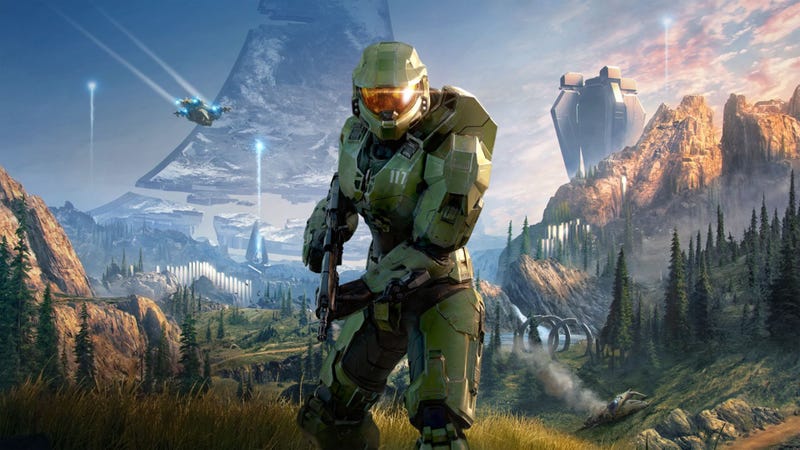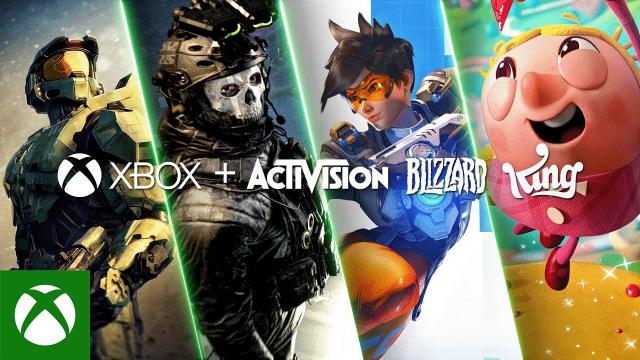If you haven’t heard the news already, Xbox finally closed its Activision Blizzard acquisition deal to the tune of $US69 billion. With this move, Activision CEO Bobby Kotick is getting ousted at the beginning of the year, all while getting a golden parachute of $US400 million. Well, at least the silver lining in all this corporate nonsense is Xbox has a slew of iconic franchises and characters in its stable, right? …Right?
I don’t want to spend too long getting into the inherent grossness that is the video game industry’s continued consolidation, but after watching the trailer, ad, or whatever you want to call this nearly two-minute video Xbox released when the news broke, it’s at the forefront of my mind. Microsoft is framing its acquisition of Activision Blizzard as a kind of homecoming for characters like Crash Bandicoot, the Overwatch heroes, and Mr. Call of Duty, when in reality it was a shrewd business decision to take advantage of an opening to buy a company that was in shambles due to a very public workplace harassment lawsuit. The fanfare isn’t really surprising, as Microsoft made a similarly grand gesture when it acquired Bethesda.
The whole dressing up and making a show of money moving is its own problem, and it frankly makes my skin crawl. But this trailer also puts all these acquisitions Microsoft has made in the past decade next to each other, and in doing so makes it pretty apparent that, despite buying a lot of studios, Microsoft’s roster of characters still isn’t even close to reaching the same level of recognition as those of its contemporaries.
Why can’t Xbox’s heroes compare?
Microsoft has been playing catch-up since the Xbox One’s stumbles put the system in second place behind Sony’s PlayStation 4. Xbox’s strategy in the following years has been to acquire smaller studios like Double Fine and Ninja Theory, and then industry behemoths like Bethesda and Activision Blizzard. Years later, it finally feels like Xbox is getting games out of these studios’ devkits and onto store shelves and digital marketplaces. 2023 has been especially fruitful for Xbox and Windows, with Bethesda accounting for some of the most notable games of this year like Starfield and Hi-Fi Rush. 2024 has a few standouts coming as well, with Obsidian’s Avowed and Ninja Theory’s Senua’s Saga: Hellblade II set to come to Xbox Series X/S and PC next year.
But even so, looking at this consolidation ad with all these games together, it really feels like Xbox Game Studios’ characters lack the distinctive pop that makes for an interesting ecosystem. Chunks of this trailer showcase generic stand-ins for gameplay loops people know and love, but which lack a face and name you’d immediately recognize. This isn’t a knock on these games’ quality, more on how, because Xbox has been spending the last decade getting its shit together, it doesn’t feel like we’ve gotten nearly as much time to know most of these characters as Nintendo or Sony’s stables.
To be fair, Microsoft does have a few gaming icons up its sleeve. My feelings on the Halo series aside, Master Chief is more recognizable than swaths of the Super Smash Bros. roster. Steve from Minecraft is so big he got added to (and banned from) Nintendo’s game. Crash Bandicoot being an Xbox character now is one of the wildest pieces of irony of all, given he was once the defacto PlayStation mascot in the ‘90s. And fight me, haters, the Overwatch heroes are beloved, even if the game itself is in disarray. But broadly, even if Xbox is finally catching up on first-party IP, the company still has a lot of work to do on the cultural cachet of its heroes.
As a crossover IP mashup, Super Smash Bros. is something few companies can even aspire to. Sony even tried with 2012’s PlayStation All-Stars Battle Royale, which had a lot of well-known characters like Kratos and Nathan Drake, but was notably hamstrung by companies wanting to use it to advertise upcoming games instead of paying tribute to their history, not to mention others being unwilling to play ball. Fast-forward eight years, and Sony released Astro’s Playroom as a packaged game with the PS5. It wasn’t a platform fighter, but it did lovingly pay tribute to PlayStation history going back decades and illustrates the legacy of its heroes from Spyro to Ellie.

Reshaping the faces of the Xbox brand
I watch Microsoft’s celebratory video and wonder what an Xbox equivalent tribute even looks like. The Xbox brand of today is unrecognizable from what it was when it began, as only a couple of characters have had the staying power to be part of Microsoft’s plan in 2023. Master Chief and Marcus Fenix are well-loved, but they can’t carry a brand on their beefy shoulders alone. This video reminds us that Microsoft has the money to throw around to try and make a solid first-party ecosystem, I just wonder if it has the plan in place to make Xbox heroes as memorable and culturally significant after all the checks have been cashed.
The truth is, Xbox has access to a fair few popular legacy characters that it has only paid homage to in passing. The purchase of Rare in 2002 gave Microsoft beloved platformers like Banjo-Kazooie and Conker that have almost exclusively been acknowledged in promotional crossovers. A compilation package like Rare Replay shows Microsoft is aware of the legacy some of its characters have with long-time fans, and the 2020 Battletoads game was a fun homage to an old favorite. But these are passing investments in legacy games rather than doubling down to keep the franchises vital.
Sure, not every “legacy” IP that’s laid dormant for so long will enjoy the same mass appeal it once did, but those examples do speak to an underlying issue: Xbox’s nurturing of its own IP has been spotty, at best. I want that to change, because part of what makes it interesting to watch a console ecosystem grow is seeing what characters are still around decades after their journeys began. Perhaps in the near future we’ll gain a better vision of what the faces of the Xbox brand are, because it seems like Microsoft is still figuring that out, too.

Leave a Reply